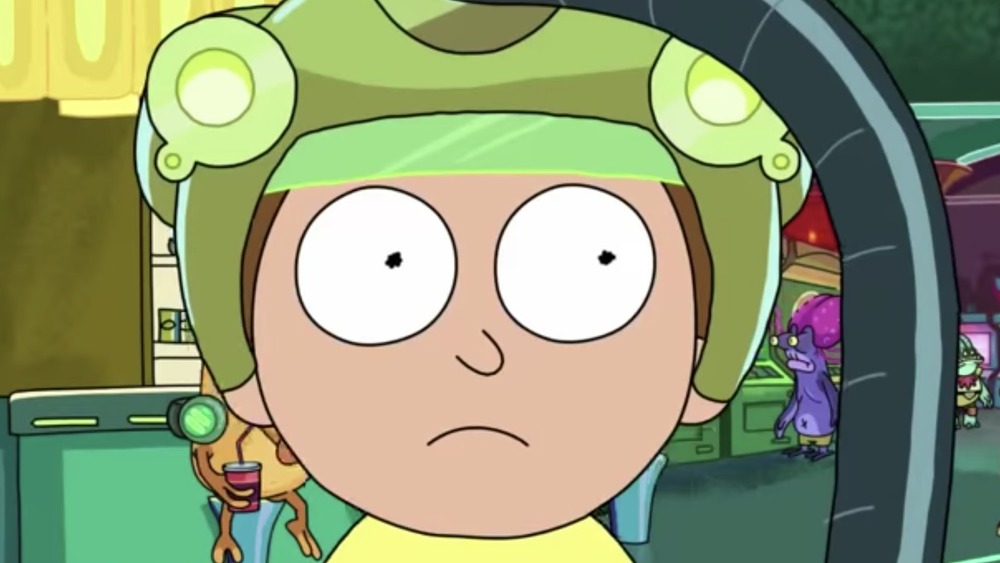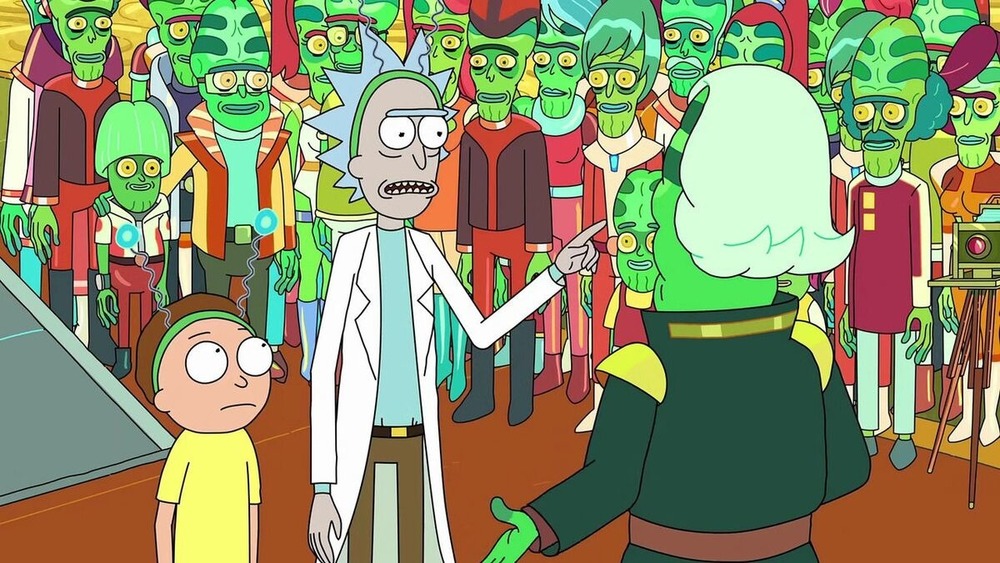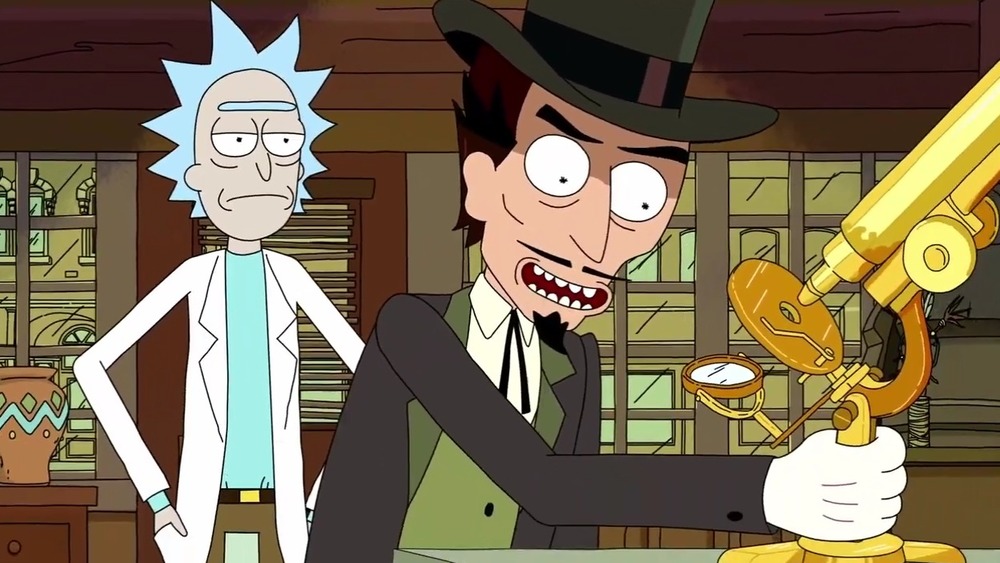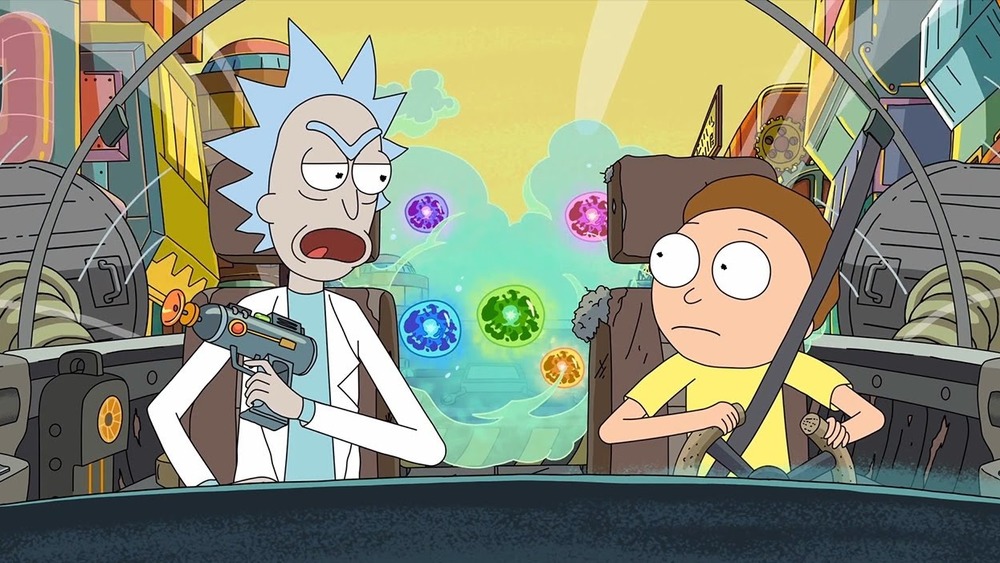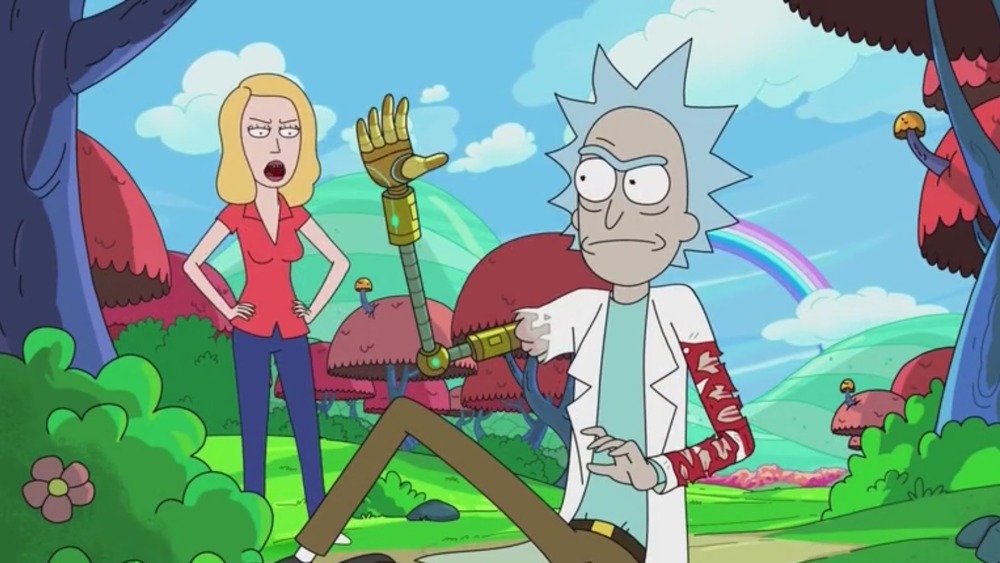The Most Obscure Movies Behind Rick And Morty's Episode Titles
The Adult Swim animated series Rick and Morty is finely calibrated for maximum rewatch value – especially if you want to understand the entire story. The adventures of the "smartest man in the universe," the alcoholic, dimension-traversing mad scientist Rick Sanchez (voiced by Justin Roiland), and his put-upon grandson Morty Smith (also Roiland) knows how to milk a bizarre premise for every possible gag — that's for certain.
The show's "more is more" aesthetic even extends to one area that a goodly portion of viewers simply don't pay much attention to: its episode titles, which are never mentioned onscreen. If you've streamed Rick and Morty or fallen down a wiki-hole trying to parse out all of those references, you've probably noticed that most of these titles are phrases that you've likely heard before, only with "Rick" or "Morty" shoehorned in there somewhere. Some of the works these titles refer to are thematically linked to the episode, but many are not — and while none of them exactly glide off the tongue, some of them may have left you wondering just what the heck is being referenced.
Let's take a look at some of the more obscure movies that have had their titles Rick-ified by Rick and Morty.
The Ricks Must Be Crazy: an eighties arthouse comedy
The season 2 episode "The Ricks Must Be Crazy" gave us our best idea yet of the kind of slippery moral slope Rick is capable of traversing with pretty much zero problems. In it, Rick, Morty, and Morty's sister Summer find that Rick's car battery has died after they catch a movie. Leaving Summer in the vehicle (which Rick gives instructions to protect his granddaughter, a directive that escalates in horrifying ways), he and Morty venture inside the battery — which is actually its own tiny universe, powered by the never-ending labor of its inhabitants, who generate electricity by stomping on "Gooble Boxes." When Rick (whom the society worships as its creator god) finds that one of the universe's scientists has replicated his feat, creating another tiny, self-powered universe within his own, he must try to convince the guy that "microverse" technology is immoral without exposing his own hypocrisy.
The title is taken from the 1980 arthouse comedy The Gods Must Be Crazy, in which an African tribesman named Xi recovers a Coca-Cola bottle dropped from a passing plane. Believing it to have been dropped by the gods, Xi sets out to return it, in the process getting his first taste of civilization and finding it to be ... well, less civilized than one might think. The fish-out-of-water tale bears little resemblance to the plight of the microverse's inhabitants in "The Ricks Must Be Crazy," a title for which the show's writers had to dig pretty deep — but if you lived in a society that held Rick Sanchez up as a god, it would probably encapsulate your feelings pretty nicely.
Something Ricked This Way Comes: a live action Disney flop
Season 1's "Something Ricked This Way Comes" is one of Rick and Morty's most obvious parodies; its main plot sends up the work of Stephen King, in particular the 1991 novel Needful Things. In the episode, Summer gets a job at a kitschy little store by that name, run by a sinister man who is actually named "Mr. Needful," and who is quite obviously the Devil. Everything he sells in the store comes with an ironic curse, which of course Rick catches onto immediately — but rather than force the guy out of business, Rick simply opens his own store across the street, "Curse Purge Plus," which specializes in removing those pesky curses.
One would expect the title to be a play on a King novel, but this isn't the case. Something Wicked This Way Comes is a fantasy film from 1983, written by the great Ray Bradbury and based on his 1963 novel. In it, a pair of young boys in a small Illinois town are intrigued by a traveling carnival run by the ominous "Mr. Dark," who seems to have a keen interest in a giant storm that is approaching the town. Aside from the on-the-nose surnames of their respective antagonists, the Rick and Morty episode owes very little to the movie, which is really only noteworthy for a couple of reasons. First, it was one of the weird, dark live-action films produced by Disney in the '70s and '80s, which also included titles like Escape to Witch Mountain, The Black Hole, and The Watcher in the Woods. Second, it was a titanic flop, managing only $8.4 million at the box office on a budget over twice that (via Box Office Mojo).
Mortynight Run: an overlooked classic
If you're a big fan of '80s comedies, then the inspiration behind the title of the season 2 Rick and Morty episode "Mortynight Run" won't be too much of a mystery. If you haven't seen the 1988 buddy comedy Midnight Run, then you're in for a treat, because it's a flick that in a just universe would be mentioned in the same breath with immortal classics like Beverly Hills Cop (with which it shares a director) and Trading Places. The flick stars Robert DeNiro as Jack Walsh, a bounty hunter enlisted to drag hapless mob accountant Jonathan "The Duke" Mardukas (a perfectly cast Charles Grodin) across the country before his bail bondsman can default. Midnight Run's pleasures are many — including fantastic comedic chemistry between its two leads, a supporting cast full of scene-stealers like Yaphet Kotto, John Ashton, and Joe Pantoliano, and some of the most hilarious action sequences ever put to film.
In "Mortynight Run," Rick sells an antimatter gun to Krombopulos Michael —a hired killer who is really, really enthusiastic about his job — in order to afford an afternoon at intergalactic arcade "Blips & Chitz." Of course, Morty is troubled enough by the immorality of Rick's action to intervene, saving the killer's target — a gaseous cloud named "Fart," whose soothing songs about Moon Men and poetic manner of speech hide a troubling objective. Once again, the events of the episode bear only superficial similarities to the movie from which it took its title — but if even one person was inspired to seek out and watch Midnight Run due to the homage, then it was creative energy well spent.
The ABC's of Beth: a great indie horror anthology
One of the most egregiously messed-up episodes Rick and Morty has yet produced (and we know that's saying a lot), season 3's "The ABC's of Beth" confirmed what many of us had long suspected: that Rick's daughter Beth Smith is, in fact, the most disturbed character on the show. In the episode, Beth remembers playing in an imaginary world called "Froopyland" as a child — a land which actually wasn't quite so imaginary. In fact, it had been created by Rick as a safe place for his young daughter, whom Rick calls a "scary f***ing kid," to indulge her whims without hurting anyone. As it turns out, though, Beth had brought along a boy named Tommy to play with her in Froopyland one day — and then left him there, forcing him to survive by a process which is, frankly, too disgusting and horrifying to print here.
It's a premise that actually would have made an excellent short for The ABC's of Death, the excellent 2012 horror anthology film from which the episode took its name. The flick features 26 chapters, one for each letter of the alphabet, each directed by a different filmmaker from around the world. Like most anthologies, the film has its peaks and valleys — but overall, it's an extremely entertaining watch, with shorts that run the gamut from laugh-out-loud funny to seriously disturbing. A sequel, The ABC's of Death 2, was released in 2014, followed by The ABC's of Death 2.5 — which features all of the best audition films submitted for the letter M — in 2016. Horror fans should absolutely check out all of them, as they're a scary good time — although perhaps not quite so scary as Beth's childhood toy box.
